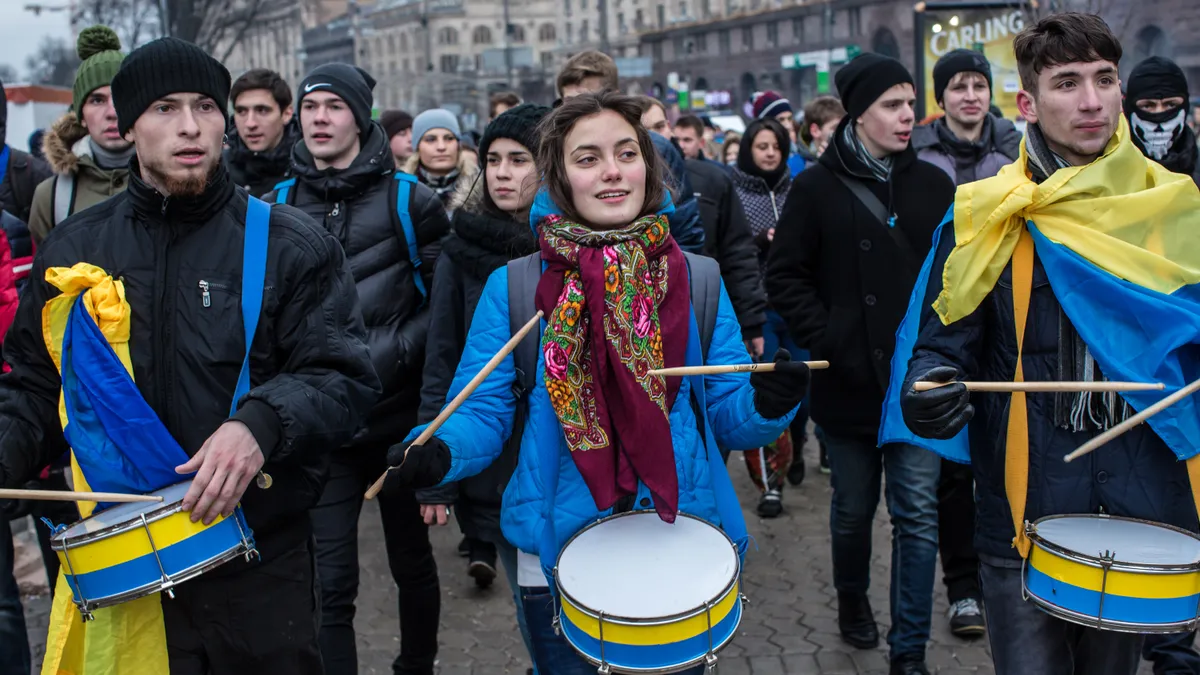Dive Brief:
- Colleges are offering both international and domestic students support and resources, like counseling and advising, in the wake of Russia's invasion of Ukraine last week.
- Institutions like Pennsylvania State University, the University of Utah and Princeton University have addressed students directly in community-wide messages and are providing services to help those affected.
- Education advocates, meanwhile, are pushing for federal protections for Ukrainian students in the U.S., such as Temporary Protected Status that would extend work permit eligibility and protection from deportation. Homeland Security Secretary Alejandro Mayorkas on Thursday said he would give a TPS designation to Ukrainians living in the U.S., including those on temporary student visas, according to CBS News.
Dive Insight:
More than 1,700 Ukrainian students studied in the U.S. during the 2020-2021 school year, according to Open Doors data. Exponentially more students likely have ties to the country, with over a million Americans reporting Ukrainian ancestry, according to 2019 Census data.
In a Feb. 25 letter to the Syracuse University community, Chancellor and President Kent Syverud called the pictures coming out of Ukraine horrific and offered mental health resources and student advising options to students, faculty and staff.
Syverud acknowledged what he called an unusually high percentage of Syracuse community members who are active-duty military, along with students and staff who have Ukrainian and Russian ties. University representatives have reached out directly to students from the impacted area, according to the message.
The university-wide letter came two days after Syverud addressed the university's faculty senate.
"A widening conflict in Europe is likely to make it quite a bit more challenging for us as a global university to realize our vision of being a place that is welcoming to all," he said in a statement. Syverud called on the university's leaders and academic experts to prepare for continuing challenges, taking into account how Syracuse responded to the recent upheaval in Afghanistan.
Michigan State University President Samuel Stanley sent out a similar letter, promoting counseling services and advising options at the Office for International Students and Scholars.
Many international students at Michigan State are worried about their friends and family and feel especially separated by time zones and a lack of information, according to that office's director, Krista McCallum Beatty.
"Home can feel very far away right now," she said. "These students are young adults and, for some of them, they haven't been able to travel home as much as they'd have liked because of the pandemic."
A long-standing partnership between Beatty's office and the university's counseling and psychiatric services department is helping Michigan State students who are impacted by this situation.
"One of their counselors has office hours in my department every week," said Beatty. "It's a great way to help students make the initial connection with the counselor."
Affected students have also come together to support one another and educate others about the conflict. The Michigan State Ukrainian Students Organization on Tuesday held a rally on campus in support of Ukraine, an event Beatty attended.
"The students who organized the rally, they did a really nice job," she said. "They want people to learn about and understand the situation, and do what they can to provide assistance to people in Ukraine."
Education leaders are also calling for federal policy updates to help Ukrainian students studying at U.S. colleges. The Presidents' Alliance on Higher Education and Immigration, a coalition of over 500 college leaders, encouraged its affiliates to advocate for changes like a TPS program and providing Special Student Relief for Ukrainians studying in the U.S.
Moves like those would give Ukrainian students who are studying in the U.S. breathing room during a tumultuous time, according to Jill Welch, senior policy advisor on international student and refugee learner issues at the Presidents' Alliance.
"We have to use what tools are available within the context of existing immigration law in order to provide for these students," said Welch. The protections would allow students to change their circumstances, such as dropping below a full course load or working more hours, and still maintain their immigration status.
The Presidents’ Alliance also noted availability of student support options, including grants under the Power of International Education's Emergency Student Fund. Power of International Education members can nominate students who are impacted by the war in Ukraine for funds to cover essential needs.














